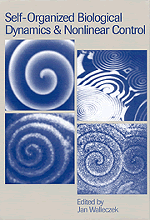 Self-Organized Biological Dynamics and Nonlinear Control
Self-Organized Biological Dynamics and Nonlinear Control Published online by Cambridge University Press: 14 August 2009
The consideration of random fluctuations is central to any discussion of the limits of biological stimulus–response interactions. The conventional view holds that stochastic perturbations diminish the efficiency of biological signal detection and transduction pathways. Part III provides an overview of the recently found constructive role of noisy fluctuations in biochemical and biological processes. Two major concepts have emerged for describing such noise-facilitated processes, stochastic resonance and fluctuation-driven transport. In Chapter 10, Frank Moss opens with an overview of the history and of the physical principles of stochastic resonance. He then extends this discussion into the realm of biology and medicine, and offers experiments that demonstrate stochastic resonance in the detection by organisms of dynamical signals, including weak electric fields. The chapter concludes with new evidence for spatiotemporal stochastic resonance in two-dimensional systems. Sergey Bezrukov and Igor Vodyanoy take the discussion of stochastic resonance to the molecular level in Chapter 11. Their experiments demonstrate the noise-improved transduction of electrical signals by voltage-gated ion channels in a planar lipid bilayer.
To save this book to your Kindle, first ensure [email protected] is added to your Approved Personal Document E-mail List under your Personal Document Settings on the Manage Your Content and Devices page of your Amazon account. Then enter the ‘name’ part of your Kindle email address below. Find out more about saving to your Kindle.
Note you can select to save to either the @free.kindle.com or @kindle.com variations. ‘@free.kindle.com’ emails are free but can only be saved to your device when it is connected to wi-fi. ‘@kindle.com’ emails can be delivered even when you are not connected to wi-fi, but note that service fees apply.
Find out more about the Kindle Personal Document Service.
To save content items to your account, please confirm that you agree to abide by our usage policies. If this is the first time you use this feature, you will be asked to authorise Cambridge Core to connect with your account. Find out more about saving content to Dropbox.
To save content items to your account, please confirm that you agree to abide by our usage policies. If this is the first time you use this feature, you will be asked to authorise Cambridge Core to connect with your account. Find out more about saving content to Google Drive.